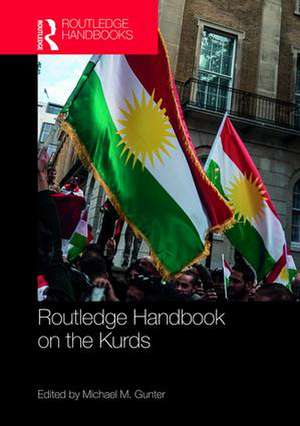Routledge Handbook on the Kurds
Editat de Michael Gunteren Limba Engleză Hardback – 8 aug 2018
This multidisciplinary Handbook provides a definitive overview of a range of themes within Kurdish studies. Topics covered include:
- Kurdish studies in the United States and Europe
- Early Kurdish history
- Kurdish culture, literature and cinema
- Economic dimensions
- Religion
- Geography and travel
- Kurdish women
- The Kurdish situation in Turkey, Iraq, Syria and Iran
- The Kurdish diaspora.
| Toate formatele și edițiile | Preț | Express |
|---|---|---|
| Paperback (1) | 307.11 lei 6-8 săpt. | |
| Taylor & Francis – 30 iun 2020 | 307.11 lei 6-8 săpt. | |
| Hardback (1) | 1218.96 lei 6-8 săpt. | |
| Taylor & Francis – 8 aug 2018 | 1218.96 lei 6-8 săpt. |
Preț: 1218.96 lei
Preț vechi: 1673.52 lei
-27% Nou
Puncte Express: 1828
Preț estimativ în valută:
233.32€ • 253.52$ • 196.12£
233.32€ • 253.52$ • 196.12£
Carte tipărită la comandă
Livrare economică 21 aprilie-05 mai
Preluare comenzi: 021 569.72.76
Specificații
ISBN-13: 9781138646643
ISBN-10: 1138646644
Pagini: 496
Ilustrații: 6 Line drawings, black and white; 4 Tables, black and white; 9 Illustrations, black and white
Dimensiuni: 174 x 246 x 33 mm
Greutate: 0.98 kg
Ediția:1
Editura: Taylor & Francis
Colecția Routledge
Locul publicării:Oxford, United Kingdom
ISBN-10: 1138646644
Pagini: 496
Ilustrații: 6 Line drawings, black and white; 4 Tables, black and white; 9 Illustrations, black and white
Dimensiuni: 174 x 246 x 33 mm
Greutate: 0.98 kg
Ediția:1
Editura: Taylor & Francis
Colecția Routledge
Locul publicării:Oxford, United Kingdom
Public țintă
Postgraduate and UndergraduateCuprins
Introduction Part I Kurdish studies 1. Kurdish studies in the United States 2. Kurdish studies in Europe Part II Early Kurdish history 3. The Kurdish emirates: Obstacles or precursors to Kurdish nationalism? 4. An overview of Kurdistan of the 19th century 5. The development of the Kurdish national movement in Turkey from Mahmud II to Mustafa Kemal Ataturk Part III Kurdish culture 6. Ehmede Xani’s Mem u Zin: The consecration of a Kurdish national epic 7. Classical and modern Kurdish literature 8. Calibrating Kurmanji and Sorani: Proposal for a methodology 9. Kurdish cinema Part IV Economic dimensions 10. The oil imperative in the KRG 11. De-development in Eastern and Southeastern Anatolia Part V Religion 12. Islam and the Kurds 13. The inadequate Islamic grappling with the Kurdish issue 14. The Jewish communities in Kurdistan within the tribal Kurdish society 15. Yezidi baptism and rebaptism: Resilience, reintegration, and religious adaptation Part VI Geography and travel 16. The geopolitics of the Kurds since World War I: Between Iraq and other hard places 17. Roaming Iraqi Kurdistan Part VII Women 18. Kurdish women Part VIII The Kurdish situation in Turkey 19. The rise of the pro-Kurdish democratic movement in Turkey 20. The Kurdistan Workers Party (PKK) and Kurdish political parties in the 1970s 21. Turkey’s Kurdish complexes and its Syrian quagmire Part IX The Kurdish situation in Iraq 22. The state we’re in: Postcolonial sequestration and the Kurdish quest for independence since the First World War 23. The disputed territories of Northern Iraq: ISIS and beyond 24. The continuing problem of KRG corruption 25. The Russian historical and political approach towards nonconventional independence of Iraqi Kurdistan Part X The Kurdish situation in Syria 26. The Kurdish PYD and the Syrian Civil War 27. The evolution of Kurdish struggle in Syria: Between Pan-Kurdism and Syrianization, 1920–2016 28. The roots of democratic autonomy in Northern Syria—Rojava Part XI Iran 29. Iran and the Kurds Part XII The Kurdish diaspora 30. The future of the Kurdish diaspora 31. Diasporic conceptions of the Kurdistan Region of Iraq 32. The Kurds in Germany 33. The Kurdish diaspora in the UK
Notă biografică
Michael M. Gunter is a Professor of Political Science at Tennessee Technological University and the Secretary-General of the EU Turkey Civic Commission (EUTCC), headquartered in Brussels. He is the author or editor of 15 scholarly books on the Kurdish and Armenian issues as well as over 100 peer-reviewed scholarly articles.
Recenzii
"...edited by Michael M. Gunter, who is himself probably the most prolific of today’s scholars of Kurdish politics... Gunter has made an effort to juxtapose different viewpoints in each section, some chapters being sympathetic with the Kurdish movements described and others more critical[...] The history of the Kurdish movement, from the early twentieth century until the defeat of ISIS, is well covered and there are interesting though partial observations on changes in the political economy and social organisation of Kurdistan. [...] Kurdish scholars will find a few chapters that provide significant new information or analysis... Non-specialists who consult it as a work of reference may find it helpful for contextualising news reports." — Martin van Bruinessen, Utrecht University, The Netherlands, book review appeared in Kurdish Studies, May 2020
"Edited by Michael M. Gunter, who is himself probably the most prolific of today’s scholars of Kurdish politics and who persuaded over thirty colleagues to contribute chapters." - Martin van Bruinessen, Utrecht University, The Netherlands, review in Kurdish Studies
"Edited by Michael M. Gunter, who is himself probably the most prolific of today’s scholars of Kurdish politics and who persuaded over thirty colleagues to contribute chapters." - Martin van Bruinessen, Utrecht University, The Netherlands, review in Kurdish Studies
Descriere
This multidisciplinary Handbook provides a definitive overview of a range of themes within Kurdish studies. Topics covered include: Kurdish Studies in the US and Europe; Kurdish History and Culture; Economic Dimensions; Religion; Geography and Travel; Kurdish Women; the Kurdish situation in Turkey, Iraq, Syria and Iran, and the Kurdish Diaspora.
